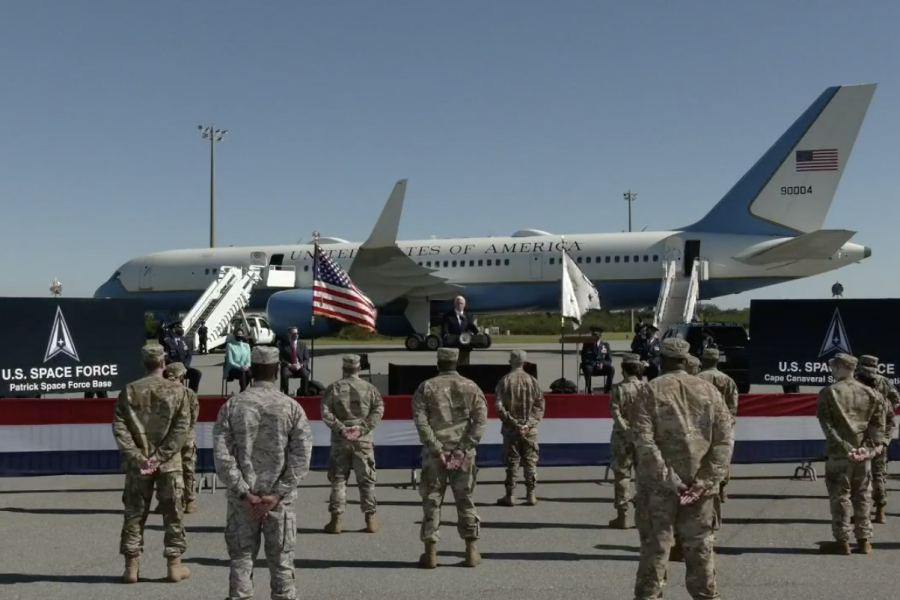Historic Air Force installations on Florida’s Space Coast marked a modern milestone on Dec. 9 as they were redesignated Patrick Space Force Base and Cape Canaveral Space Force Station—the first facilities named as part of the new service.
“Today, we start a new era at both Cape Canaveral Space Force Station and Patrick Space Force Base, aligning the installations’ names with their critical missions,” Space Force Chief of Space Operations Gen. John W. “Jay” Raymond said at a ceremony to mark the occasion.
Cape Canaveral has served as America’s premiere space launch facility since the 1950s, and is now transforming to meet the needs of a modern space age defined by companies like SpaceX and Blue Origin. The Air Force for years has managed launch operations at the Cape via the 45th Space Wing at Patrick, which itself is taking on more responsibilities as military space begins a new chapter.
Several high-ranking military officials attended the event, including Raymond, Deputy Defense Secretary David L. Norquist, Air Force Chief of Staff Gen. Charles Q. Brown Jr., Air Force Secretary Barbara M. Barrett, and Vice Chairman of the Joint Chiefs of Staff Gen. John E. Hyten. They praised the navigation, missile warning, communications, and other missions the Space Force looks to expand in support of terrestrial troops.
Vice President Michael R. Pence unveiled new signs bearing the service’s delta logo and the fresh names on a black background, with Air Force Two looming in the background.
“We will always seek peace through strength. … We will be prepared to defend our nation and defend our freedom in space,” Pence said. “Stay on mission. Be vigilant. Take care of your people.”
While the names will switch over, a more formal transfer is yet to come. The Space Force said in a release that jurisdiction and command of the installations “will remain under the Air Force until officially transferred at a future date to be determined” as the Pentagon makes final decisions on Space Force facilities.
The Florida installations were supposed to be renamed earlier this year, but the military said it would hold off amid the coronavirus pandemic until it was safer to convene for a celebration. This week’s event abuts the Space Force’s first birthday on Dec. 20.
Defense One reported Dec. 7 that the Pentagon would move forward with redesignating Patrick and Cape Canaveral despite a “gentleman’s agreement” with congressional staffers that the executive branch would hold off until after the fiscal 2021 defense policy bill is signed into law.
The final draft of the legislation, released earlier this month, includes a provision stating that military installations “may not be transferred to the jurisdiction or command of the Space Force” until the Air Force Secretary briefs lawmakers on the costs associated with bringing those facilities under the new service. The Secretary has to hold that briefing no later than 15 days after finishing the business-case analysis.
That language stemmed from the Senate’s version of the bill earlier this year.
Other bases expected to fall under the Space Force include Vandenberg Air Force Base, Calif.; Peterson, Schriever, and Buckley Air Force Bases, Colo.; and Cheyenne Mountain Air Force Station, Colo.
A Senate Armed Services Committee staffer did not respond to questions about base renaming, and the Department of the Air Force declined to comment. It’s unclear if the Secretary will need to include Patrick and the Cape in the analysis of base transfers, or how it will affect the timing of further ceremonies.
The Department of the Air Force will continue to oversee all installations in the Air Force and Space Force, and offer services like base security to Space Force facilities.
“The new designation will not affect current base operating support, funding, or current agreements at Patrick Space Force Station or Cape Canaveral Space Force Station,” according to a USSF release.
President Donald J. Trump also wants to dedicate a Space Force base to Charles E. “Chuck” Yeager, the iconic test pilot and retired Air Force brigadier general who died Dec. 7.
“I spoke to the President this morning,” Pence said. “He directed me to begin immediately to identify future Space Force bases that can be renamed in the honor of the service and character and leadership of General Chuck Yeager, and so we will do.”
When reached for comment about a potential Yeager base, Space Force spokeswoman Lynn Kirby said the service has “nothing on this topic.”
Later the same day, the Trump administration released a new policy document directing the U.S. to exercise “the inherent right of self-defense” in space. The National Space Policy lays out several points directing the Defense Department to work with the Intelligence Community, NASA, the Commerce Department, and others to deconflict rules and responsibilities across the federal government while pursuing new space capabilities.
“The United States considers the space systems of all nations to have the right to pass through and conduct operations in space without interference. Purposeful interference with space systems, including supporting infrastructure, will be considered an infringement of a nation’s rights,” the document said.
“The United States will seek to deter, counter, and defeat threats in the space domain that are hostile to the national interests of the United States and its allies. Any purposeful interference with or an attack upon the space systems of the United States or its allies that directly affects national rights will be met with a deliberate response at a time, place, manner, and domain of our choosing.”
Editor’s Note: The story was updated at 8:25 p.m. on Dec. 9 with additional basing information from the Department of the Air Force.
